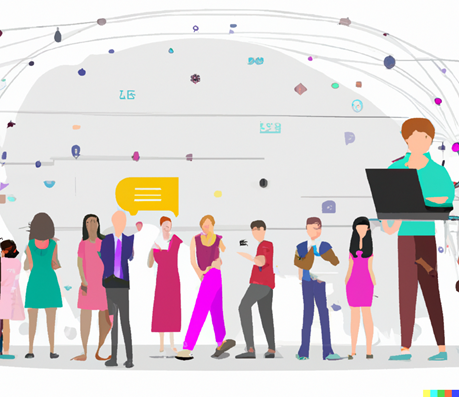
Image source: DALL·E 2
Profesional de la información (EPI)
Theme: Public participation in science
Issue: v. 33, n. 7
Publication date: December 2024
Manuscript submission deadline: 20 April 2024
Guest editors:


Tenured Associate Professor
Universitat Politècnica de València (UPV)
Assistant Professor
Universidad Complutense de Madrid (UCM)
About this special section
Science is moving towards new participatory ways of generating knowledge that integrate different perspectives and forms of knowledge that can help better understand global challenges, improve decision-making, and strengthen democracies (Monzón-Alvarado et al., 2020). Citizen science is one of the many forms of public participation in the production of scientific knowledge in which citizens get involved in different ways (through knowledge, tools or resources) (Socientize Project, 2013).
The multiple benefits of this methodology include the democratization of science, increased public participation (scientific literacy), the generation of new knowledge, the expansion of researchers’ capabilities or the increase in geographic reach, among others. (Conrad; Hilchey, 2011; West; Pateman, 2017).
Previous studies also show an increase in the number of projects, as well as publications (Pelacho et al., 2020). Despite all these benefits and its potential application in multiple areas of knowledge (Conrad; Hilchey, 2011; Jordan Raddick et al., 2013; Sullivan et al., 2014; Tauginienė et al., 2020), there is still a lot of uncertainty regarding to the collection (and quality) of data, the level of participation and ethical issues (invisibility of citizens), among others (Ali et al., 2019; Conrad; Hilchey, 2011, Elliott; Rosenberg, 2019; Kullenberg; Kasperowski, 2016), as well as its contribution to science.
From the perspective of information sciences, most previous studies have analyzed the results of research (scientific articles) in science (Bautista-Puig et al., 2019; Kullenberg; Kasperowski, 2016; Pelacho et al., 2020) or it is approached from the perspective of communication (Sierra-Caballero, F., 2022) and, mostly, from a top-down perspective, for example, on how various scientific investigations include this type of research, as well as its characteristics. (themes, etc.). However, little is known from a bottom-up perspective (for example, the level of citizen involvement in science, gratitude, outputs generated, etc.).
Through this special section, we want to analyze the potential of citizen science in the progress of science. We are interested in receiving articles from all disciplines (and interdisciplinary) that illustrate through case studies how citizen science contributes at different levels (local, regional, national or international). We also invite contributions that describe the potential role of the different agents involved (scientists, citizens), as well as contributions that show the link of citizen science and its integration/complementarity with other types of data sources.
Topics
The topics for this special section are the following (but not limited):
-Transdisciplinarity
-Co-creation/Co-design
-Collaboration between different actors
-Level of citizen involvement
-Public participation in science
-Research results
Submission of manuscripts
EPI is a 100% OA journal that is funded by charging APCs (article processing charges). In 2024 the cost of APC is GBP 2,000
Submit your article through the OJS journal management platform at:
https://revista.profesionaldelainformacion.com/index.php/EPI/submissions
Important for authors
If you are not yet registered as an author, do it here:
https://revista.profesionaldelainformacion.com/index.php/EPI/user/register
New:
Publisher
Since January 2024, Profesional de la Información is published by Oxbridge Publishing House, UK.
New:
Language
The articles of Profesional de la Información are published either in English or in Spanish, to be chosen by the author.
New:
References format
Authors must submit the bibliography in APA format.
Evaluation
All articles published in EPI are double-blind peer reviewed by two or more members of the journal’s International Scientific Council, and other reviewers, always external to the Editorial.
ESPAÑOL
Tema: Participación pública en la ciencia
Número: v. 33, n. 7
Fecha de publicación: diciembre de 2024
Fecha límite de envío de manuscritos: 20 de abril de 2024
Editores invitados


Enrique Orduña-Malea
Profesor
Universitat Politècnica de València (UPV)
https://www.directorioexit.
enorma@upv.es
Núria Bautista-Puig
Profesor asistente
Universidad Complutense de Madrid (UCM)
https://www.directorioexit.
nuriabau@ucm.es
La ciencia se está moviendo hacia nuevas formas participativas de generar conocimiento que integran diferentes perspectivas y formas de conocimiento que pueden ayudar a comprender mejor los desafíos globales, mejorar la toma de decisiones y fortalecer las democracias (Monzón-Alvarado et al., 2020). La ciencia ciudadana es una de las muchas formas de participación pública en la producción de conocimiento científico en la que los ciudadanos se involucran de diferentes maneras (a través de conocimiento, herramientas o recursos) (Socientize Project, 2013).
Desde la perspectiva de las ciencias de la información, la mayoría de los estudios previos han analizado los resultados de la investigación (artículos científicos) en ciencia (Bautista-Puig et al., 2019; Kullenberg; Kasperowski, 2016; Pelacho et al., 2020) o se aborda desde la vertiente de la comunicación (Sierra-Caballero, F., 2022) y, mayoritariamente, desde una perspectiva top-down, por ejemplo, sobre como diversas investigaciones científicas incluyen este tipo de investigación, así como sus características (temáticas, etc.). Sin embargo, poco se conoce desde una perspectiva bottom-up (por ejemplo, el nivel de involucración ciudadana en ciencia, agradecimientos, outputs generados, etc.).
Temas
Los temas para esta special section son los siguientes (pero no limitados):
-Transdisciplinariedad
-Co-creación/ Co-diseño
-Colaboración entre los diferentes actores
-Nivel de involucración ciudadana
-Participación pública en ciencia
-Resultados de investigación
Envío de manuscritos
EPI es una revista 100% acceso abierto que se financia mediante el cobro de APCs (cargos por procesamiento de artículos). Para 2024 el coste de la APC es de GBP 2.000
Envía tu artículo a través de la plataforma de gestión de revistas OJS en:
https://revista.profesionaldelainformacion.com/index.php/EPI/submissions
Importante para autores
Si aún no estás registrado como autor hazlo aquí:
https://revista.profesionaldelainformacion.com/index.php/EPI/user/register
Nuevo:
Editorial
Desde enero de 2024, Profesional de la Información es una publicación de Oxbridge Publishing House, Reino Unido.
Nuevo:
Idioma
Los artículos de Profesional de la Información se publican en inglés o en español, a elección del autor.
Nuevo:
Formato de referencias
Los autores deben enviar la bibliografía en formato APA.
Evaluación
Todos los artículos publicados en EPI son revisados por pares en doble ciego por dos o más miembros del Consejo Científico internacional de la revista, y otros revisores, siempre externos a la Editorial.
